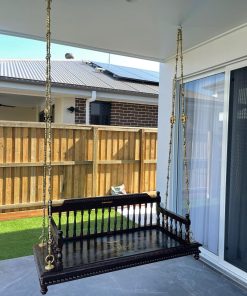Jhula / Jhoola / Swing / Oonjal. traditional indian swing, chetinad swing
$1,990.00
Traditional Swing
Teak Wood Traditional Carved Swing/Oonjal/Jhula With Backrest And Side Support (Brass Chain)
$1,990.00
Traditional Swing
Teak Wood Traditional Carved Swing/Oonjal/Jhula With Backrest And Side Support (Brass Chain)
$1,990.00
Traditional Swing
Teak Wood Traditional Carved Swing/Oonjal/Jhula With Backrest And Side Support (Brass Chain)
$2,490.00
Traditional Swing
Teak Wood Traditional Carved Swing/Oonjal/Jhula With Reversable Backrest (Brass Chain)
$2,490.00
Traditional Swing
$2,690.00
The traditional swing, also known as a "jhula" in India, holds great cultural and social significance. It is a suspended seat, often crafted from wood or metal, and has been an integral part of Indian homes and outdoor spaces for generations. Traditional swings are often intricately designed and can be adorned with cushions and fabrics for comfort and aesthetics.
In Indian culture, swings are commonly associated with leisure, relaxation, and social gatherings. They are often used during festivals, weddings, and other celebrations, providing a place for people to sit, relax, and socialize.
The gentle swaying motion of the swing is believed to have a calming effect and is particularly popular among children and the elderly. In some regions, it's also a common sight to see swings placed under large trees, providing a peaceful spot for contemplation and relaxation.
Swings are also popular in traditional Indian courtyard homes, where they add to the charm and beauty of the outdoor space. Many modern homes and hotels in India also incorporate traditional swings as a way to connect with heritage and provide a unique, inviting space for guests.
The traditional swing holds a special place in the hearts of many Indians, as it symbolizes comfort, community, and the simple joys of life "Jhula" refers to a swing or a suspended seat often used for relaxation or religious purposes. Here are a few common types of jhulas:














